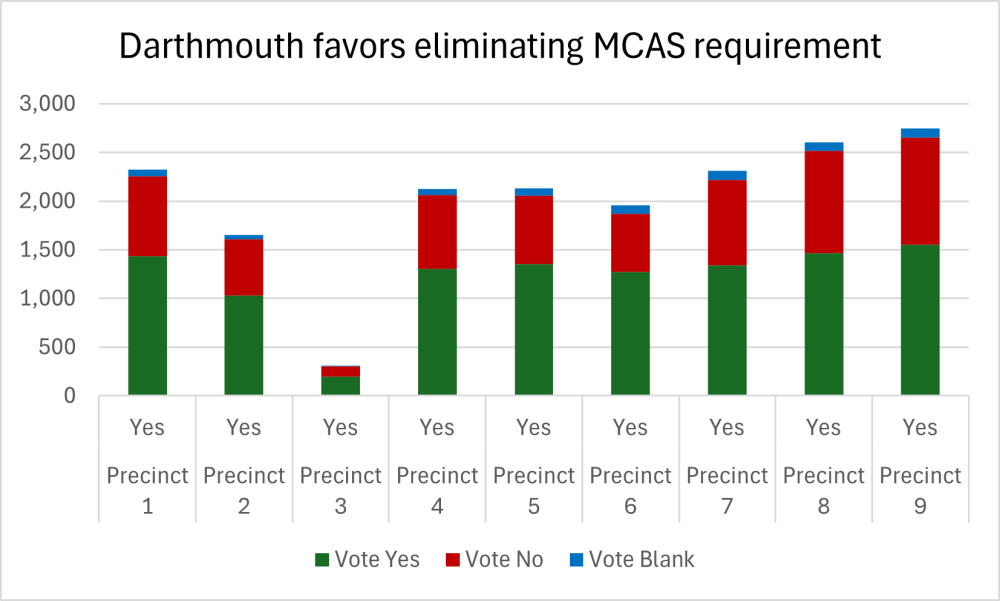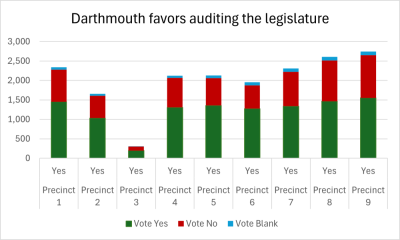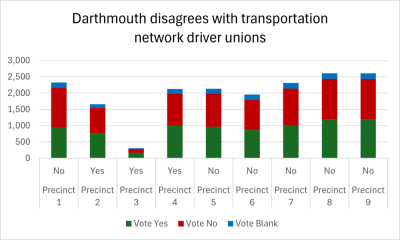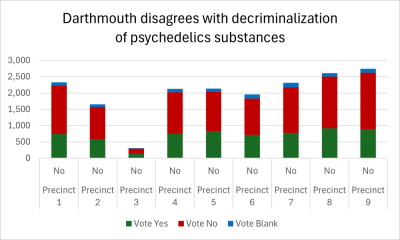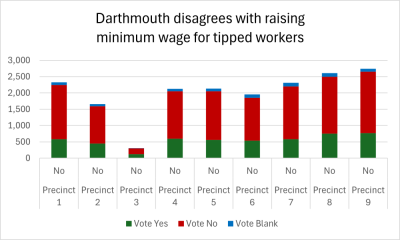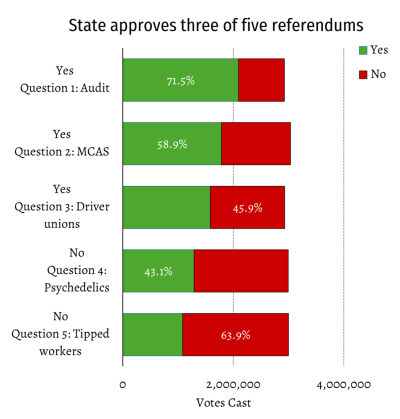MCAS will be administered in town despite vote to remove graduation requirement
Nearly 60% of Massachusetts and Dartmouth voters favor ending the MCAS graduation requirement, but the Dartmouth School Committee says the test will continue to be administered in town.
“We’re holding our own,” said School Committee Chair Chris Oliver at the Monday, Nov. 4 meeting.
Superintendent June Saba-Maguire said the test is “an important measure of how our students are doing academically and just for us to continue to monitor their progress toward meeting the standards.
A “relatively small” percentage of Dartmouth students fail to meet the competency determination each year, and those that do have opportunities to retest, said Director of Teaching and Learning Ross Thibault.
“They have opportunities to retest in November, again in February, and then in certain circumstances in the spring as well, depending on their unique needs,” Thibault said.
The proposed law would have replaced the MCAS with coursework that demonstrated students had met the state academic standards for mathematics, science and English as well as any additional topics determined by the Department of Elementary and Secondary Education.
Those wishing to remove MCAS requirements argued that the standardized evaluation forces educators to teach to a test. Conversely, supporters labeled the requirements removal as “unfair” and “radical,” writing that the test is the only statewide graduation requirement.
Some Dartmouth residents who spoke in favor of keeping the test at the polls on Tuesday shared the same sentiments as the school department.
Fatimatu Malekani, of precinct nine, said, “I think Massachusetts has some of the best schools,” adding how she didn’t think removing the requirement would be best in sustaining that.
Chris Frias, of precinct one, visited the North Branch Library polls with his daughter Leah, 12. Though Leah was not in favor of the graduation requirement because she doesn’t like the test, Frias said he would be voting to keep it.
“I just think it’s a good barometer to see how kids are doing,” he said. “There should be some kind of bar to graduate and this is the only bar I think that Massachusetts has, right?”
Over at precinct six, Daniel Amaral spoke in favor of removing the requirement because of his son who has a learning disability.
“I don’t feel that the MCAS is appropriate in that regard for him because he really can’t do a standardized test to merit what he’s actually learning,” Amaral said.
In addition to MCAS, Dartmouth voters favored ending allowing the state auditor to audit the State Legislature but were against giving transportation-network drivers the chance to unionize, legalizing limited psychedelic substances and raising the minimum wage for tipped workers.
All five referendum questions made their way onto the ballot by initiative petition, a process used by Massachusetts voters to gather public support for laws and propose them to the state legislature. If the legislature does not pass the proposed bill, the petitioner can collect more signatures from the public, if enough residents sign, the bill is then placed on the ballot for the next election.
Dartmouth voters decided that the state auditor should be allowed to audit the State Legislature with 63.5% voting yes and 29% voting no to Question 1. On the state level, 71.5% of voters were in favor of auditing the legislature.
“That one was huge for me,” Amaral said. “I feel that they should be audited, absolutely.”
Over at the North Branch Library, Bill of precinct one, who chose not to share his last name, said, “The legislature has been hiding.”
He pointed out how Massachusetts is one of the last states to not require the legislature to follow open records law. “That’s ridiculous,” he said.
Dartmouth voters decided transportation-network drivers, who work for companies like Uber and Lyft, should not have the right to form unions with 44.7% of voters marking yes on Question 3 and 48.3% marking no. Of Massachusetts voters, 54.1% were in favor of granting the drivers the right to unionize.
The law allows “active drivers,” defined as workers who have completed more than the median number of rides in the last six months, to collectively bargain with their employers. The bill also establishes a hearing process for drivers to seek compensation for “unfair work practices,” according to the Secretary.
Amaral used to work part time as a Door Dash driver and said he wasn’t in favor of transportation-network drivers having the right to form unions.
“I think it wouldn’t be fair to the people that were just being part-timers and just want to do it when they want to do it,” he said.
Voters in Dartmouth decided to not allow Massachusetts residents to grow, possess and use under supervision certain psychedelic substances with 34.8% voting yes and 60.1% voting no to Question 4. On the state level, 56.9% of voters rejected the decriminalization of psychedelic substances.
The proposed law would have allowed residents age 21 or older to possess a personal use amount of psilocybin, psilocyn, dimethyltryptamine, mescaline and ibogaine and grow the substances in a 12 by 12 foot area at their home. The law prohibited the retail sale of any of the substances but allowed for their purchase and use in a therapeutic setting.
“The psychedelic one kind of threw me off a little bit, like why would we want to do that?” said Rhonda Gomes.
Amaral voted in favor of Question 4.
“I feel if there’s an option for someone out there that can improve their overall health, I think you should be able to access it,” he said.
Dartmouth voters were not in favor of increasing the hourly wage of tipped workers with 27.2% voting yes on Question 5 and 68.8% voting no. Of Massachusetts voters, 63.9% were also not in favor of increasing the hourly wage.
The bill created a timeline for the employers of tipped workers, gradually increasing their employees hourly pay until it matched minimum wage by 2029. The law included an allowance for “tip pools,” equally splitting workers' tips among all employees, if the establishments hourly wage matched the state minimum wage.
Amaral, who used to work in the food service industry, said he voted against raising the minimum wage.
“I just feel you make more money on tips, and if you provide good service, you’re going to get paid,” he said.
Rosanna Carreiro, of precinct one, said she was “kind of torn” on the question and wished that she could have spoken with more people about the issue.
“I don’t know if we’re doing [the servers] an injustice by voting for it, or against it,” she said. “I just kind of want to do what’s best for the workers and I’m kind of conflicted on what actually is best for them.”



